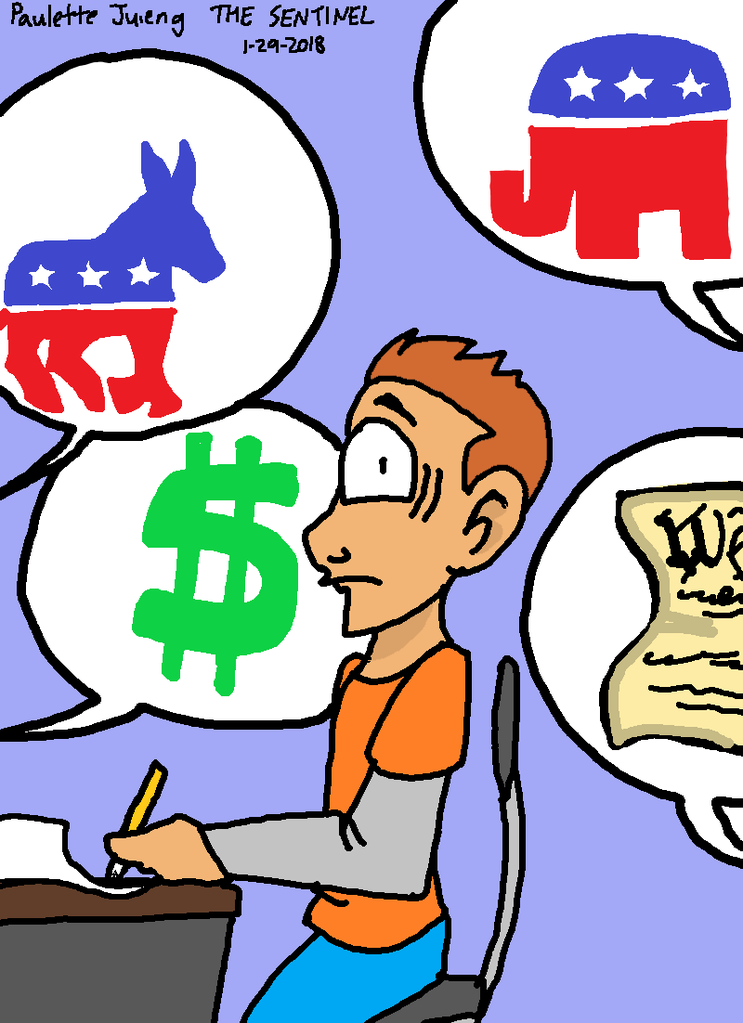With politics being such a touchy subject in this day and age, discussing them in class may be a sore experience for students, but with preparation and mediation, discussions can flow smoothly.
The relevance of politics and current events, however, means that a confrontation is all but inevitable in the classroom.
Pursuing a college education requires a willingness to confront and discuss difficult questions in and out of the classroom, including how what we are learning relates to the culture and events around us. That means confronting the social environments we are steeped in and discussing politics with structure, guidance and respect in the classroom.
Discussing politics in the classroom is an uncomfortable experience when students are not prepared. Forcing students to discuss politics without a framework for discussion gets messy quickly as ideology and convictions can turn a cordial conversation into a heated disagreement all too easily, dividing a classroom and seeding resentment in the learning environment.
According to a Chicago Tribune article by Stephen Carter many students wish to avoid debating politics for fear of conflicts with their peers or belittlement from professors. This stifles academic discussion before it even begins and leaves the loudest voices in the room arguing with each other.
Megan Humphreys, a junior history education major, recalls a scenario playing out in her sophomore year during a run of the mill sociology class. A student chose to pursue a political point during the lecture and derailed the class.
“There was a student who got incredibly heated about certain government programs and the purpose of welfare and things like that,” Humphreys said. “He was really fighting with her, but my professor was just trying to teach from the textbook.”
Despite attempts by the teacher to move on, it took a lot of class time to stop the discussion and continue the lecture. Humphreys noted that the experience was “very uncomfortable” for her fellow students and detracted from precious lecture time.
According to a survey by Hayley Glatter in The Atlantic, experiences like this tend to plague freshman and sophomore level courses where students are likely to strongly disagree with each other, incentivizing students and teachers to avoid politics in the future. However, as a university, ignoring politics altogether is just as unhealthy for the student body as is yelling at peers.
In order to avoid moments like this, professors must be very deliberate in preparing students for difficult dialogues in the classroom by establishing codes of conduct and a careful, methodical approach to potential controversy. Professors need to slowly introduce and guide students while maintaining tight control over the discussion to keep it from evolving into a shouting match.
An important element in preparing students to engage in politics is trust. According to a study conducted by the Institute for Democracy and Higher Education, talking politics is easier when students and professors have had time to build relationships with one another and are familiar with each other’s presence.
This means that valuable discussion begins at the sophomore and junior level after students have settled into their studies and established respect with their peers and teachers.
“We should be able to discuss politics and things that may be touchy in a safe environment. That’s what the classroom should be,” Humphreys said.
Civil conversations also require an agreement between students and professors to respect each other in specific roles. Students must see each other as peers, not opponents, and professors ought to be treated as mediators facilitating a dialogue instead of dictating it. Whenever students are asked to broach the topic, the figure of authority must be ready to guide students toward respectful and rational manners of discussion.
Without a framework to talk about such things, and without an environment tailored to facilitate these conversations, the student body suffers. Ideologies cement rather than evolve, and rhetorical skills are lost in favor of volume. It is crucial that we learn here, in the academic environment, how to talk to each other about divisive and complex concepts without resorting to anger so that we may be effective communicators with nuanced, matured ideas upon leaving the university.




